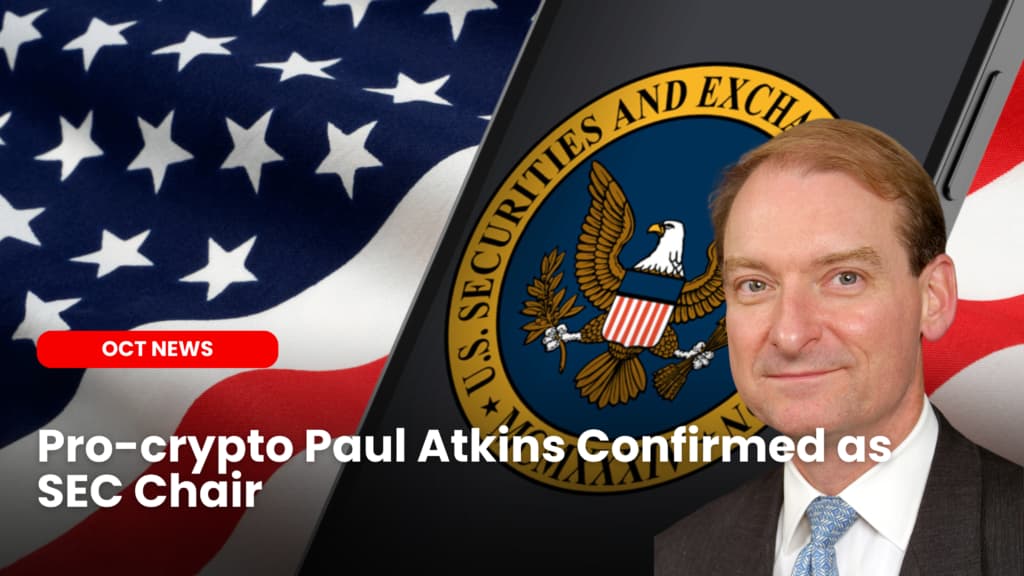
The U.S. Senate has confirmed Paul Atkins as the new Chair of the Securities and Exchange Commission (SEC) in a 52-44 vote.
Author: Sahil Thakur
The U.S. Senate has confirmed Paul Atkins as the new Chair of the Securities and Exchange Commission (SEC) in a 52-44 vote, setting the stage for a new era in financial regulation, especially in the fast-evolving digital asset space. Atkins, a former SEC Commissioner under the George W. Bush administration, will serve through June 5, 2026.
His appointment by President Donald Trump has been closely watched by both traditional finance and crypto communities, given Atkins’ pro-market stance and his history of advising digital asset firms through his consultancy, Patomak Global Partners.
Atkins’ confirmation marks a significant departure from the regulatory approach taken by his predecessor, Gary Gensler, whose tenure was defined by aggressive enforcement actions against crypto firms. Under Gensler, the SEC filed lawsuits against several major platforms, initiated high-profile enforcement actions, and maintained a broad interpretation of what constitutes a security in the digital space.
During his confirmation hearing, Atkins signaled a more open stance toward crypto innovation. “I have seen how ambiguous and non-existent regulations for digital assets create uncertainty in the market and inhibit innovation,” he said in written testimony.
Since Gensler’s departure, interim SEC chief Mark Uyeda began scaling back enforcement, shedding several crypto-related cases and outlining areas the agency no longer considers under its jurisdiction — including stablecoins, memecoins, and proof-of-work mining.
Now, Atkins inherits a commission in transition, tasked with crafting permanent standards for the digital asset space. He takes office at a time when public forums on crypto regulation have begun, and Congress is weighing new legislation to clarify digital asset classifications.
The confirmation comes amid increasing calls from institutional investors for regulatory clarity. A recent EY-Parthenon survey of over 350 institutions found that 86% hold or plan to hold crypto in 2025. At the same time, firms like Coinbase have filed legal actions urging the SEC to issue formal rulemaking specific to crypto.
The lack of clear guidance has left firms in regulatory limbo. Past attempts to register digital asset offerings with the SEC have often resulted in onerous restrictions or failed outright — as seen in the case of Robinhood and other industry players. Only a handful of tokens have managed to register, and many of those saw their projects stifled in the process.
Crypto industry voices have long argued that the SEC needs tailored rules for decentralized technologies, which differ fundamentally from traditional financial instruments. Atkins’ appointment is viewed by many as a first step toward that regulatory clarity.
Since leaving the SEC in 2008, Atkins has worked closely with financial firms and crypto organizations, including as an advisor to The Digital Chamber, one of the industry’s most prominent lobbying groups.
His return to the SEC is expected to bring regulatory restraint and policy recalibration, particularly regarding innovation in blockchain-based financial services.
Atkins is also likely to play a key role in shaping how real-world assets, stablecoins, and decentralized platforms are regulated in the U.S. This could have major implications for the development of tokenized finance, Web3 infrastructure, and retail-accessible investment products like Bitcoin ETFs.
Despite the momentum, Atkins enters an agency facing internal instability. The SEC has recently lost staff through buyouts and retirements, and currently operates with an incomplete commission. Only one Democrat, Commissioner Caroline Crenshaw, remains — and she is serving on an expired term.
The White House has yet to nominate replacements for the two open Democratic seats. In the meantime, Atkins will lead a Republican-leaning commission, giving him room to implement policy shifts — at least in the short term.
Atkins’ appointment could lead to greater regulatory clarity for crypto investors, developers, and institutions. Expect fewer lawsuits and more structured conversations about how digital assets should be regulated in the U.S.
For builders and token projects, this might be an opportunity to engage with regulators more constructively. But until formal rules are published, uncertainty will likely persist.
Disclaimer: This is not financial advice (NFA). Always do your own research before making investment decisions or interpreting regulatory developments.
Even though the news was somewhat overshadowed by the tariffs pause news, there were still notable people who were showing support to Paul Atkins on social media, including crypto’s own Senator Lummis.

Our Crypto Talk is committed to unbiased, transparent, and true reporting to the best of our knowledge. This news article aims to provide accurate information in a timely manner. However, we advise the readers to verify facts independently and consult a professional before making any decisions based on the content since our sources could be wrong too. Check our Terms and conditions for more info.


White House Says No Pardon for Sam Bankman-Fried
Meta Plans Stablecoin Integration in H2 2026 for Payments
New Humanity AI Trust Expands Verified Digital Infrastructure
Mantle DeFi TVL Doubles to Over $450 Million After Aave Launch
White House Says No Pardon for Sam Bankman-Fried
Meta Plans Stablecoin Integration in H2 2026 for Payments
New Humanity AI Trust Expands Verified Digital Infrastructure
Mantle DeFi TVL Doubles to Over $450 Million After Aave Launch